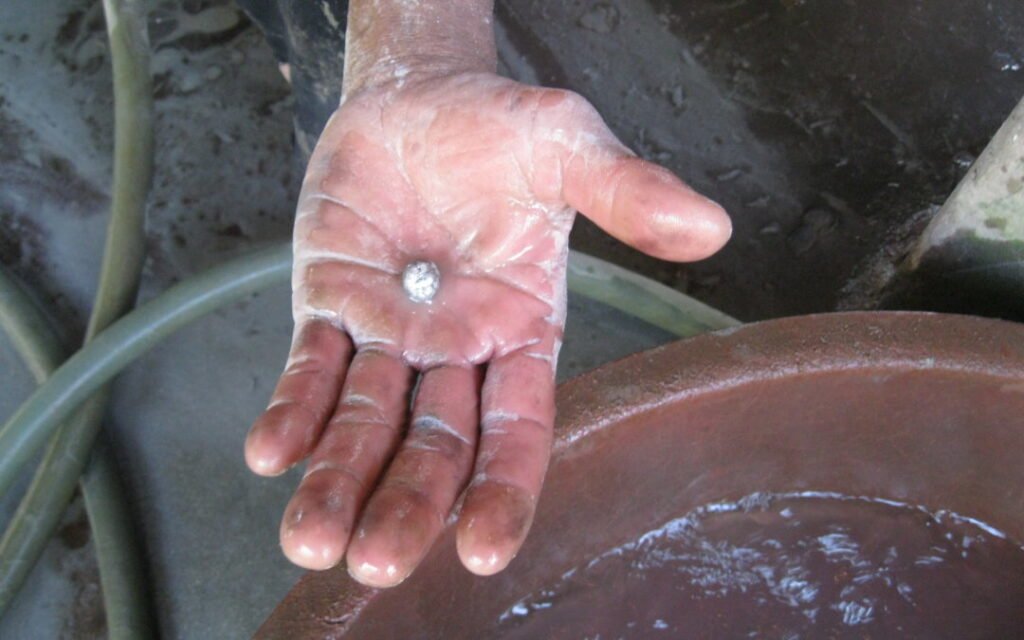
Work should take place in a safe and healthy working environment; work conditions should be consistent with workers’ well-being and human dignity; work should offer real possibilities for personal achievement, self-fulfillment, and service to society.- International Labor Organization (ILO)
General Characteristics of Mercury
- Did you know there’s a metal that’s liquid at room temperature? That’s mercury! It’s shiny and silvery, like a tiny moving mirror.
- Mercury can quickly turn into vapor, which you can’t see- it’s essential to be careful because those fumes can be harmful.
- This unique metal also loves to team up with other metals, forming unique combinations.
- We find tiny amounts of mercury in nature as a liquid metal in rocks and sand—but don’t worry—it’s not very common.
- Most of our mercury comes from a unique rock called cinnabar ore. Scientists have been on a treasure hunt to find these rocks in usable amounts and have found them in a few places worldwide. Unfortunately, mining and processing mercury can release it into the environment, polluting the air and water—this can harm wildlife and contaminate the food chain.
- We can also recycle mercury from old products and waste- a more sustainable way to get this metal.
- Even tiny living things can turn mercury into a different form! This particular type of mercury can build up in fish and shellfish, so it’s essential to be mindful of where our seafood comes from.
- Luckily, scientists know this and can test fish to ensure mercury levels are safe for people to eat.
- Thankfully, scientists can test fish to ensure their mercury levels are safe for people to eat. When choosing seafood, selecting varieties lower in mercury is a good practice.
But where does all this mercury come from, and how do we use it?

Occupational Exposures
- People have been using mercury for thousands of years; in history, they even used it to make red paint for cave paintings.
- Industries also use mercury in gold mining, which releases a lot of mercury into the environment. Thankfully, many countries have banned these harmful practices today.
- Believe it or not, mercury made felt hats and treated animal fur! Thankfully, we don’t use it for that anymore.
- For a long time, mercury was also used in some medicines and fungicides to kill bacteria and fungi. Today, we have safer options.
- Even though some dentists still use mercury fillings, they’re becoming less common.
- There are still some situations where mercury can expose people, like working in older factories or doing small-scale gold mining. That’s why it’s essential to be aware of the risks and take precautions.
- Digital thermometers are now widely available and a safe alternative to mercury thermometers.
- We use rechargeable and alkaline batteries today, offering safe and effective alternatives to mercury batteries.
Understanding Mercury Exposure: Risks, Symptoms & Diagnosis
- Mercury vapor can enter your body quickly if you breathe it in. It can also enter your body slightly through your skin, but not much from swallowing it.
- Mercury mainly enters the body through the brain, kidneys, liver, and lungs.
- There are different mercury compounds, and your body can absorb some more quickly than others. They can enter your body through your lungs, stomach, or skin.
- Some types of mercury, like methylmercury, are especially harmful because they can easily reach your brain and unborn babies. This type of mercury can also stay in your body long.
- The body gets rid of most mercury through pee and poop, but small amounts can come out in sweat, breath, and even tears.
- Do not play with old thermometers or contact professionals for cleanup if you suspect a spill.

Acute Health Effects of Mercury Exposure
High levels of mercury exposure can cause some scary symptoms. These can include:
- Eye irritation (like pink eye) can make your eyes red, watery, and itchy.
- A burning feeling in your mouth and throat
- Skin rashes
- Trouble breathing can feel like tightness in your chest or coughing.
- Stomach problems can include nausea, vomiting, or diarrhea.
- Kidney damage
- Brain problems
Remember, this information is for general knowledge only. If you suspect mercury exposure, you should see a doctor immediately.
Breathing in, touching, or swallowing too much mercury can be dangerous and cause problems with your:
- Lungs – making it hard to breathe
- Kidneys – affecting how they work
- Eyes – causing irritation
- Skin – leading to rashes
- Stomach and intestines – causing nausea, vomiting, or diarrhea
Inhaling mercury is more common than swallowing it, especially in workplaces.
Signs and symptoms of Acute Health Effects of Mercury Exposure
High levels of mercury exposure can cause problems in a few ways:
- If you breathe in too much mercury vapor, you can experience flu-like symptoms like chills, cough, and trouble breathing. In severe cases, it can even lead to fluid buildup in the lungs (pulmonary edema), which can be fatal.
- If mercury gets on your skin or in your eyes— it can irritate your skin and eyes and cause a metallic taste in your mouth. Mercury also causes nausea, vomiting, and diarrhea.
- High mercury exposure can also cause a rare skin condition called “pink disease” that makes the palms of your hands and soles of your feet red and swollen.
- Mercury can sometimes affect your kidneys, leading to changes in how much you pee or causing protein to show up in your urine.
- Too much mercury exposure can also have severe effects on your brain, leading to problems like tremors, hallucinations, and even memory loss. In severe cases, it can cause coma or death.
Even skin contact with mercury can be dangerous, so it’s essential to be careful.
Chronic Health Effects of Mercury Exposure
Long-term exposure to mercury, even at low levels, can cause some health problems. These can include:
- Digestive issues
- A blue-gray line on your gums (mercury pigmentation)
- Problems with taste and smell
- Brain problems that develop slowly (chronic toxic encephalopathy)
- Nerve damage (toxic polyneuropathy)
- Kidney problems
Even small amounts of mercury exposure over a long time can be harmful. Here’s what you should know:
- The main targets are your kidneys and nervous system.
- You might experience digestive problems or kidney issues.
- Pregnant women should be prudent, as mercury can harm a developing baby’s brain and motor skills.
Long-term mercury exposure can irritate your mouth and digestive system- this can cause:
- Early signs include swollen gums, increased saliva, and a metallic taste in your mouth.
- A dark line on your gums (like some people get from lead exposure).
- In severe cases, loose teeth, digestion problems, and weight loss.
- Irritation and occasional nosebleeds.
Long-term mercury exposure can affect your brain and nerves in several ways:
- Tremors are a common early sign- this can make your hands shake and affect your coordination, especially for delicate tasks like handwriting.
- In some cases, mercury exposure can cause problems with balance, speech, hearing, and vision.
- Mercury can also affect your mood and behavior, leading to anxiety, depression, and irritability.
- Memory problems, difficulty concentrating, and numbness or tingling in the hands and feet are other potential effects.
Long-term mercury exposure can affect your kidneys in several ways:
In some cases, long-term mercury exposure can harm your kidneys- this can cause them to leak protein into your urine, indicating early damage. In severe cases, it can lead to kidney failure.
Symptoms of Mercury Exposure
Symptoms from short-term high exposure:
- Flu-like symptoms: chills, cough, trouble breathing
- Eye irritation: redness, watering, itching
- There was a metallic taste in my mouth
- Nausea, vomiting, diarrhea
- Skin rash
Symptoms from long-term low-level exposure:
- Tremors in hands
- Difficulty concentrating, memory problems
- Numbness or tingling in hands and feet
- Mood swings: anxiety, depression, irritability
- Digestive problems

Key actions for prevention
The good news is that there are ways to prevent mercury poisoning! Here are some key actions:
- Limit your exposure: This is especially important if you work in a setting where mercury might be present.
- Be aware of regulations: Many countries have banned the use of mercury in products like thermometers and blood pressure cuffs.
- Consider mercury-free alternatives, including digital thermometers, alkaline batteries, and LED light bulbs.
- International efforts: There’s even a global treaty, the Minamata Convention, to reduce environmental mercury pollution.

If you work in a place that uses mercury, there are notable safety measures they should follow. These include:
- Using equipment that keeps mercury contained to prevent spills.
- Have strict cleanup procedures in case of spills.
- Using well-ventilated areas to avoid breathing in mercury vapors.
Here are some additional ways to prevent mercury exposure:
- Minimize exposure at work: If your job involves mercury, there should be measures to limit the number of people around it.
- Good hygiene: Wash your hands well after handling anything that might have mercury on it.
- Planning for pregnancy: If you plan to have children, minimizing your mercury exposure beforehand is wise.
- Pregnant and breastfeeding women: It’s essential to avoid mercury exposure during pregnancy and breastfeeding, as it can harm a developing baby.

Mercury’s Reach: Environmental Impact
Even small amounts of mercury released into the environment can travel long distances. It can settle in water and soil, where tiny organisms absorb it. As bigger fish eat smaller ones, mercury gets concentrated in their bodies. This process, called bioaccumulation, means that fish at the top of the food chain can have very high levels of mercury, which can harm them and the animals that eat them, including humans.
Thank you so much, Shawmik! Your excitement means the world to me. I can’t wait for you to explore the…
Amazing writing, keep up the good work!
Thank you so much, Shawmik! Your excitement means the world to me. I can’t wait for you to explore the…
Amazing initiative! Eagerly waiting to read all of your contents!

Leave a Reply